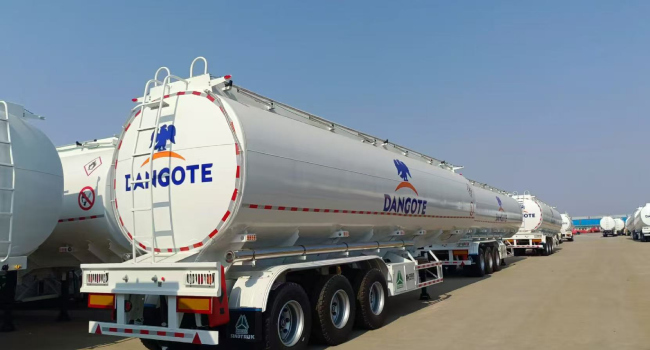The Dangote Petroleum Refinery has alleged sabotage of its deployment of Compressed Natural Gas (CNG)-powered trucks for the distribution of fuel.
The company had on September 11, announced that it will commence free direct supply of petrol across the country on September 15.
About 24 hours later, the Nigeria Union of Petroleum and Natural Gas Workers (NUPENG) said the free petrol distribution announced by the Dangote refinery is a “Greek gift”.
Last Saturday, the Depot and Petroleum Products Marketers Association of Nigeria (DAPPMAN) said the claim that the refinery offers “free delivery” was misleading, as “marketers are required to lift at least 25 percent of their allocations directly from the refinery gantry”.
Addressing the criticism that trailed the company’s plan to distribute its products in an advertorial in Nigerian dallies on Sunday, Dangote refinery said recent events and remarks show that the actions and threats from certain groups in the oil and gas sector are not driven by genuine concerns about unionisation.
“Rather, they constitute a calculated campaign of economic sabotage, orchestrated by vested interests who perceived progress as a threat to their entrenched positions,” the statement reads.
“From the outset, it has been evident that certain actors are intent on undermining the operations of the Dangote Petroleum Refinery, particularly the planned deployment of Compressed Natural Gas (CNG)-powered trucks for the distribution of fuel.
“This innovation has been widely recognised as a transformative step towards Nigeria’s long-sought goal of energy self-sufficiency.”
The refiner said it was not surprised by the disingenuous intervention of the DAPPMAN, calling it a face-saving attempt to divert attention from the real issues.
Furthermore, Dangote refinery said DAPPMAN’s claims about the quality of its imported petroleum products are contradicted by established facts.
“In January 2022, the Nigerian National Petroleum Company (NNPC) reported that one of DAPPMAN’s members had supplied petrol containing over 15% methanol, well above acceptable limits (Methanol is not standard in refinery practice, but some blenders use it to artificially raise octane levels beyond the anti-knock threshold, a questionable and unsafe approach),” the refinery said.
“The result was widespread engine damage for thousands of end users. Yet, no transparent government inquiry or independent investigation was ever conducted to determine the source, intent, or full impact of the adulterated fuel.”
















